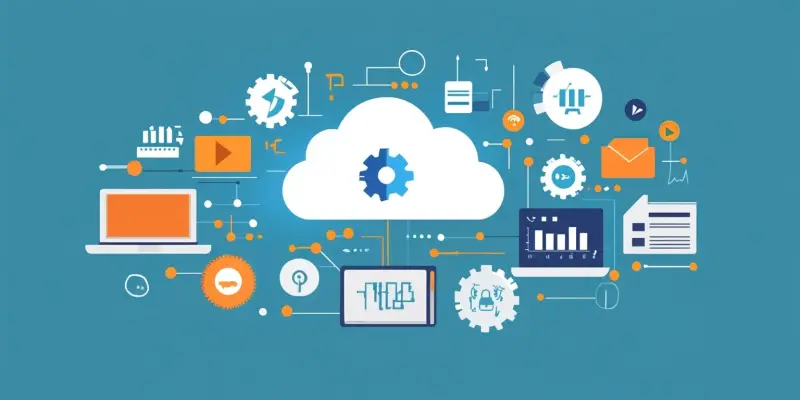As businesses grow, their management needs become more complex, necessitating a choice between traditional business tools and modern ERP systems. This article serves as a comprehensive guide to help businesses decide which option best fits their operational demands.
Cost and Implementation Timeline
Initial Costs and Long-Term Investment
Traditional ERP systems often have lower upfront costs and faster implementation, making them ideal for small businesses with limited budgets. However, as a business evolves and expands, the ongoing expenses for maintaining and upgrading fragmented systems can outweigh the initial savings. These traditional systems, while offering robust capabilities, often require significant IT resources, hardware investments, and regular maintenance efforts that can strain operational budgets over time. Additionally, fragmentation across multiple platforms can introduce inefficiencies and increased costs in ensuring these disparate systems work harmoniously.
Conversely, cloud ERP implementation requires a substantial investment of time and money upfront, generally spanning several months for thorough planning, configuration, and training. Despite this initial effort and expense, the long-term return on investment (ROI) is significant, as cloud ERP systems enhance operational efficiency and eliminate redundancies. The scalability, flexibility, and ease of access provided by cloud systems often result in operational synergies that drive down ongoing costs. Modern businesses benefit from centralized management and consistent data availability, which streamline workflows and reduce the need for extensive IT overhead.
Maintenance and Upgrades
Traditional ERP systems, installed on local or third-party servers, require significant IT resources, hardware, and maintenance. These on-premise systems often demand a dedicated IT team to handle everything from software updates, security patches, and system troubleshooting to hardware upgrades and server management. The continuous need for proficient IT personnel and resources can lead to escalating maintenance expenditures and potential downtimes, impacting the overall productivity of a business.
In contrast, cloud-based ERP solutions eliminate the need for on-premises infrastructure and typically allow for easier implementation and minimal customization compared to traditional systems. Cloud ERPs provide automatic updates and maintenance managed by the service provider, significantly reducing the burden on a company’s internal IT staff. This makes cloud ERPs increasingly popular among small and mid-sized businesses due to their cost-effectiveness and operational efficiency.
Data Precision and Decision-Making
Real-Time Data Access
Traditional systems often operate in isolation, leading to outdated or inconsistent data across various platforms. This segmentation can cause delays in decision-making and inaccuracies in reporting. For instance, finance, sales, and supply chain departments may work with disparate datasets, each updated at different times, resulting in conflicting information and operational inefficiencies.
Cloud ERP solutions provide all departments with access to a centralized database, ensuring consistent and real-time data organization-wide. This integration minimizes errors, improves data accuracy, and facilitates rapid, informed decision-making using a single source of truth.
Data Integration and Accuracy
Traditional business tools typically rely on separate software for each department, such as accounting, CRM, and payroll systems, creating data silos and inefficiencies. This necessitates manual data transfers between systems, increasing the potential for errors and creating time lags that can hinder operational responsiveness.
ERP systems provide a fully integrated platform that unifies key business functions, including finance, supply chain, HR, sales, and inventory, into one centralized hub. This integration ensures all departments operate from a single, real-time database, improving communication and collaboration across the organization. By consolidating data into one platform, businesses can benefit from greater data accuracy, streamlined processes, and enhanced visibility into operations.
Customization and Adaptability
Personalization Options
Traditional business management tools are often inflexible, designed for specific tasks, and offer limited customization. These limitations can stifle innovation and hinder an organization’s ability to quickly respond to market changes or internal demands for improved workflows.
Modern ERP systems provide extensive customization options, enabling businesses to tailor modules and workflows to their specific processes. From personalized reports and third-party integrations to custom workflows, ERP systems are created to meet unique organizational needs.
Scalability and Flexibility
ERP systems deliver greater customization and flexibility, allowing businesses to evolve and scale unlike traditional solutions that present more constraints and limited adaptability. As businesses grow and their needs change, ERP systems can be adjusted to accommodate new processes, ensuring long-term operational efficiency and scalability.
In contrast, traditional tools often require time-consuming and costly reconfigurations or entirely new implementations to keep pace with business growth. ERP systems, with their modular and flexible architecture, provide a seamless pathway for growth by enabling continuous improvements and integrations.
Security and Compliance
Advanced Security Features
Traditional ERP systems may have basic security measures but often lack the centralized, comprehensive security management provided by ERP systems. Due to the various disconnected tools in traditional solutions, ensuring consistent security and compliance can be more challenging. Managing security across multiple platforms can be cumbersome, increasing vulnerability to data breaches and compliance violations.
Cloud ERP systems are equipped with advanced security features such as user access controls, data encryption, and automated audit trails, ensuring data protection and regulatory compliance. These systems centralize security management, providing a more cohesive approach to safeguarding sensitive information.
Industry-Specific Compliance Tools
As businesses expand, their management requirements become increasingly complex, necessitating a decision between traditional business tools and modern ERP systems. Traditional business tools include software applications and manual processes that have been widely used for years. These tools often provide basic functionalities such as accounting, inventory management, and customer relationship management. However, as businesses scale, these tools may become insufficient for managing more intricate operations.
On the other hand, modern ERP systems integrate various business processes into a single platform, offering real-time data access, streamlined workflows, and enhanced collaboration. These systems can handle everything from financial management and human resources to supply chain management and e-commerce. By centralizing information and automating tasks, ERP systems aim to improve efficiency, productivity, and decision-making. This guide will explore the pros and cons of both options, helping businesses weigh their choices to ensure their operational demands are effectively met.

